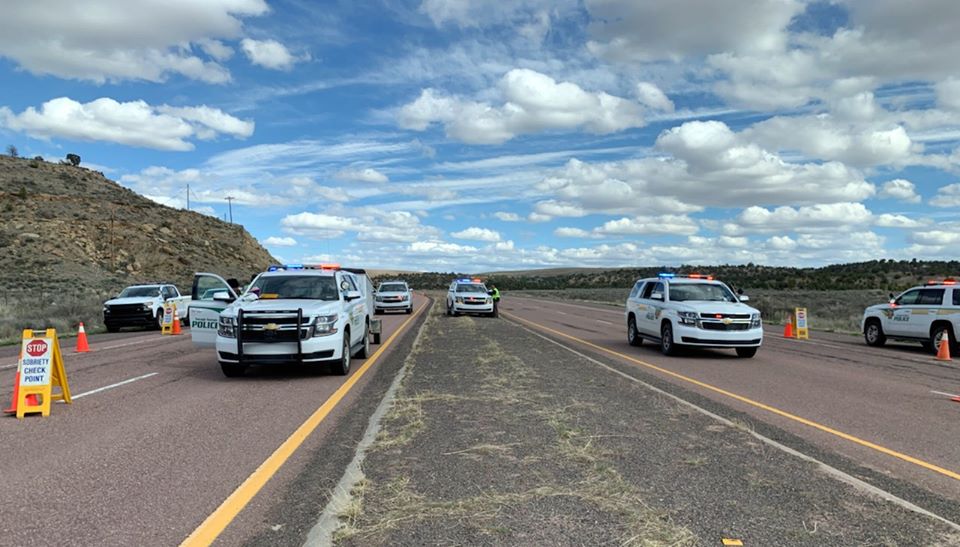
- Details
- By Levi Rickert
WINDOW ROCK, Ariz. —The Navajo Nation released an update last Monday evening that show an increase of 124 new COVID-19 cases since Saturday, which brings the total to 1,321 confirmed cases. The overall number of positive cases includes cases on the Navajo Nation and nearby border towns.
There was one additional death reported reported that brings the death toll to 45 from the virus.
The report also includes 4,579 total negative test results as of Monday. There is a total of 45 confirmed deaths related to COVID-19 as of Monday.
The 1,321 confirmed positive cases include the following counties:
- Navajo County, AZ: 332
- Apache County, AZ: 233
- Coconino County, AZ: 217
- McKinley County, NM: 306
- San Juan County, NM: 177
- Cibola County, NM: 14
- San Juan County, UT: 16
- Socorro County, NM: 13
- Sandoval County, NM: 13
On Monday, Navajo Nation President Jonathan Nez and Vice President Myron Lizer presented the State of the Navajo Nation Address live online and on KTNN 660AM, in which they focused on the many proactive measures that the Navajo Nation has implemented under their leadership. Many of the measures began nearly two months prior to the Navajo Nation’s first confirmed COVID-19 case on March 17.
On Jan. 26, the Nez-Lizer Administration issued its first public warning of the virus and followed up with seven Public Health Emergency Orders that include a Nation-wide shelter-in-place order, limiting mass gatherings, a daily curfew from 8:00 p.m. to 5:00 a.m., 57-hour weekend curfews in April, and most recently requiring everyone to wear protective masks in public to help prevent the spread of COVID-19.
“People have been calling for a complete 24/7 lockdown, but they need to remember that we already have a shelter-in-place order in effect for the entire Navajo Nation that requires everyone to stay home with the exception of essential workers, cases of emergencies, and to get essential items like food and medication. We thank everyone for respecting the stay-at-home order that was recommended by the health care professionals, police officers, and other experts. Unfortunately, we have several Navajo Police Officers who have contracted the virus. They are working hard to protect us, and we don’t have enough police force to be patrolling all of our communities 24/7. The bottom line is that people to hold themselves and others accountable for staying home and stopping the spread of COVID-19,” Navajo Nation President Jonathan Nez said.

The Navajo Police Department reported that 108 citations for curfew violations were issued during the latest 57-hour weekend lockdown from April 17 to April 20. Citations may include up to $1,000 in fines and/or 30 days in jail.
For more information including reports, helpful prevention tips, and more resources, please visit the Navajo Department of Health’s COVID-19 website at http://www.ndoh.navajo-nsn.
For up to date information on impact the coronavirus pandemic is having in the United States and around the world go to: https://www.worldometers.info/coronavirus/country/us/?fbclid=IwAR1vxfcHfMBnmTFm6hBICQcdbV5aRnMimeP3hVYHdlxJtFWdKF80VV8iHgE
For up-to-date information about COVID-19, Native News Online encourages you to go to Indian Health Service’s COVID-19 webpage and review CDC’s COVID-19 webpage.
How to help Native News Online: Send us news. Sign up for our daily enewsletter. Follow us on Facebook and Twitter. Share our articles. You can also donate to Native News Online here. Most importantly, take care of yourself. Megwetch.
More Stories Like This
Native News Weekly (August 25, 2024): D.C. BriefsNavajo Nation Mourns the Passing of Former Vice President Rex Lee Jim
Deb Haaland Earns Endorsement From Communications Workers of America Local 7076
University Soccer Standout Leads by Example
Two Native Americans Named to Democratic Congressional Campaign Committee's“Red to Blue” Program
Help us defend tribal sovereignty.
At Native News Online, our mission is rooted in telling the stories that strengthen sovereignty and uplift Indigenous voices — not just at year’s end, but every single day.
Because of your generosity last year, we were able to keep our reporters on the ground in tribal communities, at national gatherings and in the halls of Congress — covering the issues that matter most to Indian Country: sovereignty, culture, education, health and economic opportunity.
That support sustained us through a tough year in 2025. Now, as we look to the year ahead, we need your help right now to ensure warrior journalism remains strong — reporting that defends tribal sovereignty, amplifies Native truth, and holds power accountable.
 The stakes couldn't be higher. Your support keeps Native voices heard, Native stories told and Native sovereignty defended.
The stakes couldn't be higher. Your support keeps Native voices heard, Native stories told and Native sovereignty defended.
Stand with Warrior Journalism today.
Levi Rickert (Potawatomi), Editor & Publisher

